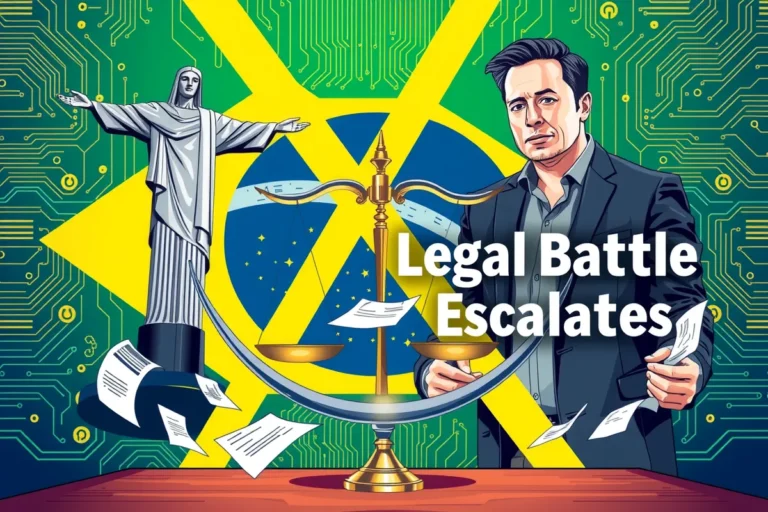🇧🇷 X (Twitter) vs. Brazil: Key Takeaways
The ongoing conflict between X (formerly Twitter) and Brazilian authorities has significant implications for social media regulation worldwide.
🚫 X to Shut Down in Brazil
X is on the brink of shutting down operations in Brazil due to an escalating legal conflict with the country’s authorities.
🌎 Global Implications
The outcome of the Brazil-X conflict could set a significant precedent for social media regulation globally, emboldening other governments to make similar demands.
🗣️ Free Speech vs. Government Control
The conflict highlights the tension between free speech, content moderation, and national sovereignty in the digital age.
👥 20 Million Users Affected
The potential shutdown of X in Brazil would impact 20 million users, including journalists, activists, and small businesses that rely on the platform.
📜 Regulatory Framework Needed
The conflict underscores the need for a new framework for social media regulation, with some experts calling for a global treaty on social media governance.
💼 Tech Companies Must Adapt
The X-Brazil conflict offers lessons for tech companies operating globally, including the need to understand local contexts, engage proactively with governments, and be transparent about policies and decision-making processes.
The Announcement That Shook Brazil
I woke up to a flurry of notifications on my phone. As a tech journalist, I’m used to breaking news, but this was different. Elon Musk, the enigmatic billionaire behind Tesla, SpaceX, and now X (formerly Twitter), had just announced that the platform would be shutting down its operations in Brazil. The reason? A bitter legal fight with Brazilian authorities.
This wasn’t just another corporate spat. It was a clash between one of the world’s most influential tech leaders and a major democratic nation. The implications were huge, not just for Brazil’s 20 million X users, but for the future of social media regulation worldwide.
As I dug deeper into the story, I realized that this conflict had been brewing for months. It wasn’t just about X or Musk; it was about the fundamental tension between free speech, content moderation, and national sovereignty in the digital age.
Understanding X: From Twitter to Musk’s Vision
To understand the gravity of this situation, we need to step back and look at what X is and how it got here.
X started its life as Twitter, a platform that revolutionized online communication with its 140-character limit (later expanded to 280). It became a global town square, where breaking news, celebrity gossip, and political debates all coexisted in real-time.
In 2022, Elon Musk acquired Twitter for a staggering $44 billion. He quickly rebranded it as X, with a vision to transform it into an “everything app” – a platform for social networking, payments, and more.
Musk’s takeover was controversial from the start. He laid off thousands of employees, including many responsible for content moderation. He also made significant changes to the platform’s policies, emphasizing what he called “free speech absolutism.”
These changes didn’t sit well with many governments and regulators around the world. They worried that a less moderated X could become a breeding ground for misinformation, hate speech, and political manipulation.
Brazil, with its recent history of political polarization and concerns about online misinformation affecting elections, was particularly wary of these changes.
The Legal Battle: A Timeline of Events
The conflict between X and Brazilian authorities didn’t happen overnight. It was the result of a series of escalating events:
- January 2023: Brazilian authorities request X to block certain accounts accused of spreading misinformation about the 2022 presidential election.
- March 2023: X complies with some requests but refuses others, citing free speech concerns.
- June 2023: Brazil’s Supreme Court fines X for non-compliance and threatens to ban the platform in the country.
- August 2023: Musk accuses Brazilian authorities of censorship and threatens to publish all takedown requests.
- September 2023: Brazil launches an investigation into X for alleged obstruction of justice.
- November 2023: X announces it will challenge Brazil’s demands in court.
- December 2023: Brazil threatens to arrest X executives if the platform doesn’t comply with court orders.
- January 2024: Musk announces X will shut down operations in Brazil rather than comply with what he calls “draconian demands.”
This timeline shows how quickly the situation escalated from a disagreement over content moderation to a full-blown legal and diplomatic crisis.
Brazil’s Stance: Protecting Democracy or Overreach?

Brazilian authorities argue that their actions are necessary to protect democracy and prevent the spread of harmful misinformation. They point to the January 2021 attack on government buildings in Brasília, which was partly organized on social media, as an example of the real-world consequences of online radicalization.
Supreme Court Justice Alexandre de Moraes, who has been at the forefront of this fight, stated: “We cannot allow our democratic institutions to be undermined by the unchecked spread of lies and conspiracy theories on social media platforms.”
Brazil’s position is that X, like any company operating within its borders, must comply with local laws and court orders. They argue that no company, no matter how powerful, should be above the law.
However, critics argue that Brazil’s approach is heavy-handed and threatens free speech. They worry that giving the government too much power to decide what can and can’t be said online could lead to censorship and the suppression of legitimate dissent.
Musk’s Response: Free Speech Warrior or Defiant Billionaire?
Elon Musk has framed this conflict as a battle for free speech. In a series of posts on X, he accused Brazilian authorities of “censorship” and “authoritarianism.”
“X will always stand for free speech, even in the face of financial loss,” Musk wrote. “We would rather leave Brazil than betray our principles.”
Musk’s supporters praise him for taking a stand against government overreach. They argue that his willingness to potentially lose a major market demonstrates his commitment to free speech principles.
However, critics accuse Musk of oversimplifying a complex issue. They point out that even in the United States, free speech has limits, especially when it comes to inciting violence or spreading harmful misinformation.
There’s also the question of whether Musk’s stance is truly about principles or if it’s a business decision dressed up as idealism. Complying with Brazil’s demands would require X to invest significantly in local content moderation, which could be costly.
The Impact on Brazilian Users
The potential shutdown of X in Brazil would have far-reaching consequences for the platform’s 20 million users in the country.
For many Brazilians, X is more than just a social media platform. It’s a vital tool for communication, news gathering, and political engagement. Journalists use it to break stories and connect with sources. Activists use it to organize and spread awareness about important causes. Even government agencies use it to communicate with citizens.
I spoke with Maria, a journalist in São Paulo, who told me: “Losing X would be a huge blow. It’s where I find breaking news, connect with sources, and share my work. I’m not sure how I’d do my job without it.”
Small businesses that rely on X for marketing and customer engagement would also be hit hard. Pedro, who runs a small coffee shop in Rio de Janeiro, said: “X is how we let customers know about our daily specials and events. It’s a free way for us to advertise. Losing that would really hurt our business.”
There’s also concern about the potential “chilling effect” on free speech. If X leaves Brazil, it could discourage other platforms from challenging government demands, potentially leading to more self-censorship and less open dialogue.
Global Implications: A Precedent for Other Nations?
The conflict between X and Brazil isn’t happening in isolation. It’s part of a global trend of governments trying to assert more control over social media platforms.
In India, the government has been in a long-running dispute with Twitter (now X) over content removal requests. In the European Union, new regulations like the Digital Services Act are imposing stricter rules on how platforms moderate content.
The outcome of the Brazil-X conflict could set a significant precedent. If X follows through on its threat to leave, it could embolden other governments to make similar demands, knowing that platforms might choose to exit rather than comply.
On the other hand, if Brazil backs down, it could make other nations more hesitant to challenge big tech companies, potentially giving these platforms even more power.
Dr. Sarah Chen, a professor of digital policy at Stanford University, told me: \“This case is being watched closely by governments and tech companies around the world. Its outcome could shape the future of social media regulation globally.\”
The Future of Social Media Regulation
The X-Brazil conflict highlights the urgent need for a new framework for social media regulation. The current system, where each country sets its own rules and platforms must navigate a patchwork of regulations, is clearly not working.
Some experts are calling for a global treaty on social media governance, similar to international agreements on climate change or nuclear weapons. This could provide a consistent set of rules for platforms to follow, regardless of where they operate.
Others argue for a more decentralized approach, with platforms giving users more control over their own experience. This could involve allowing users to choose their own content moderation algorithms or join self-governing communities within larger platforms.
Whatever the solution, it’s clear that the current situation is unsustainable. As social media becomes increasingly central to public discourse, we need a better way to balance free speech, user safety, and national sovereignty.
Lessons for Tech Companies Operating Globally
The X-Brazil conflict offers several important lessons for tech companies operating on a global scale:
- Understand local contexts: What works in Silicon Valley may not work in São Paulo or Shanghai. Companies need to invest in understanding the political, cultural, and legal landscapes of the countries they operate in.
- Engage proactively: Rather than waiting for conflicts to escalate, companies should engage proactively with governments and civil society to address concerns.
- Be transparent: Clear communication about policies, decision-making processes, and government requests can help build trust with users and authorities.
- Prepare for tough choices: Companies may increasingly find themselves caught between their principles and local laws. They need to be prepared to make difficult decisions.
- Invest in localization: This goes beyond just translating the interface. It means having local teams who understand the nuances of each market.
How Could OpenAI’s Changes Impact Legal Battles Like Elon Musk’s X in Brazil?
The recent changes at OpenAI, particularly following the news that mira murati resigns board, could significantly influence legal battles like Elon Musk’s X in Brazil. With evolving AI regulations and corporate governance, the outcome may set precedents affecting liability and accountability in tech-driven legal disputes.
What’s Next for X and Brazil?
As of now, the situation remains fluid. X hasn’t yet shut down its operations in Brazil, and there’s still hope for a last-minute resolution.
Some experts speculate that Musk’s announcement might be a negotiating tactic, designed to pressure Brazilian authorities into softening their stance. Others believe he’s serious about leaving and is willing to take the financial hit to make a point.
Brazilian officials have indicated they’re open to dialogue but insist that compliance with court orders is non-negotiable. The coming weeks will be crucial in determining whether a compromise can be reached.
Whatever the outcome, this conflict has already reshaped the debate around social media regulation. It’s forced us to confront difficult questions about the balance between free speech and social responsibility, and the role of global tech platforms in national affairs.
As we move forward, one thing is clear: the era of social media platforms operating with minimal oversight is coming to an end. The challenge now is to find a new model that preserves the benefits of these platforms while addressing their very real risks.
The X-Brazil showdown may be today’s headline, but its implications will be felt for years to come. As we navigate this new digital landscape, we must strive for solutions that protect both our right to free expression and our democratic institutions. The future of our online public square depends on it.
X’s Active Users in Brazil (Q1 2023 vs Q1 2022)
This chart compares the number of active X users in Brazil between Q1 2022 and Q1 2023, showing a 15% decline.







